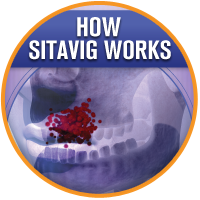Sitavig Safety Profile¹
Treatment emergent adverse events considered related to treatment that occurred in greater than or equal to 1% of patients included headache (1% Sitavig vs. 2% placebo) and application site pain (1% both arms). There was no discontinuation of Sitavig due to adverse drug reactions.
Contraindications²
Known hypersensitivity to acyclovir, milk protein concentrate, or any other component of the product.
Adverse Reactions
Most common adverse reactions (≥1%) are: headache and application site pain. For more information, please view Sitavig Full Prescribing Information (PDF – Adobe Acrobat Reader required).
Additional resources:
- Bieber T, Chosidow O, Bodsworth N, Tyring S, Hercogova J, Bloch M, Davis M, Lewis M, Boutolleau D, Attali P and the LIP Study Group. Efficacy and safety of acyclovir mucoadhesive buccal tablet in immunocompetent patients with labial herpes (LIP): A double-blind, placebo-controlled, self-initiated trial. J Drugs Dermatol. 2014;13(7):791-798. View study (link will lead you to the JDD site).
- Sitavig [package insert]. Charleston, SC: EPI Health LLC; 2015.
Indication & Important Safety Information
INDICATION
Sitavig® (acyclovir), 50mg Muco-Adhesive Buccal Tablet is indicated for
the treatment of recurrent herpes labialis (cold sores) in immunocompetent
adults.
IMPORTANT SAFETY INFORMATION
- Sitavig should not be used in patients with known hypersensitivity to acyclovir, milk protein concentrate, or other components of the product.
- Sitavig has not been studied in pregnant women or in immunocompromised patients and no interaction studies have been performed. Sitavig’s safety and efficacy have not been established in pediatric patients.
- Sitavig is a Pregnancy Category B product; therefore it should be used during pregnancy only if the potential benefit outweighs the potential risk to the fetus. It is not known if Sitavig is excreted in breast milk; however, systemic absorption is minimal.
- In a controlled clinical trial Sitavig’s most common side effects (greater than or equal to 1%) were: headache (3%), dizziness (1%), lethargy (1%), gingival (gum) pain (1%), aphthous stomatitis (canker
sores) (1%), application site pain (1%), application site irritation (1%), erythema (1%) and rash (1%). In the same trial these side effects ranged from 0%-3% for placebo.
You are encouraged to report negative side effects of prescription
drugs to the FDA. Visit www.fda.gov/medwatch.com or call
1-800-FDA-1088. Click here for Full Prescribing Information.

